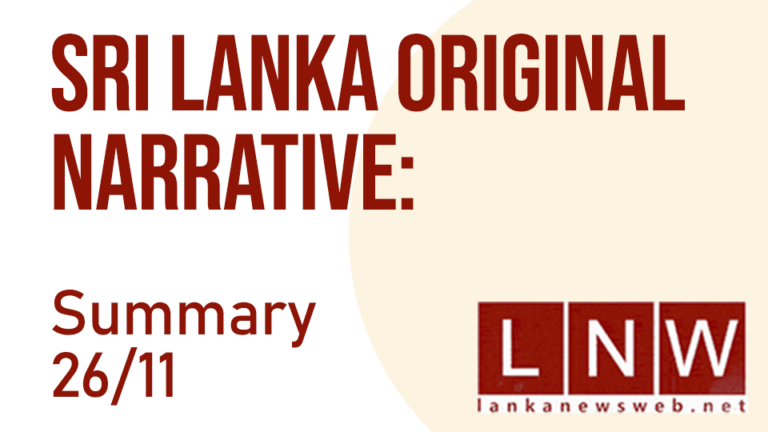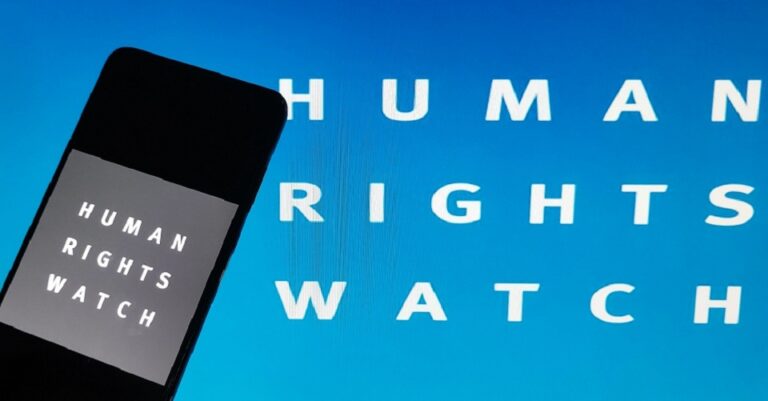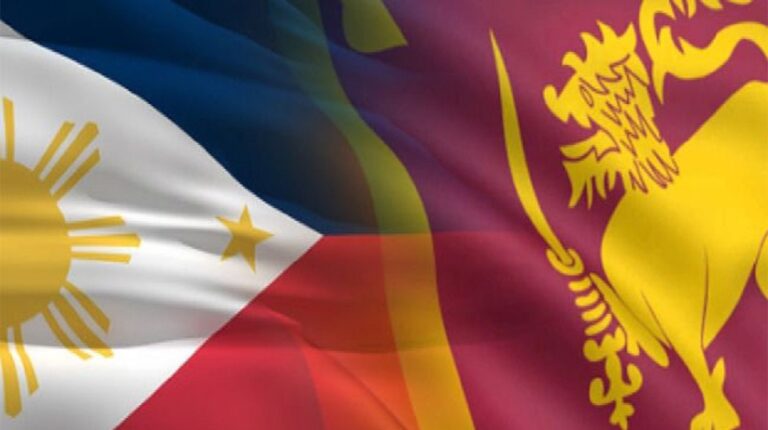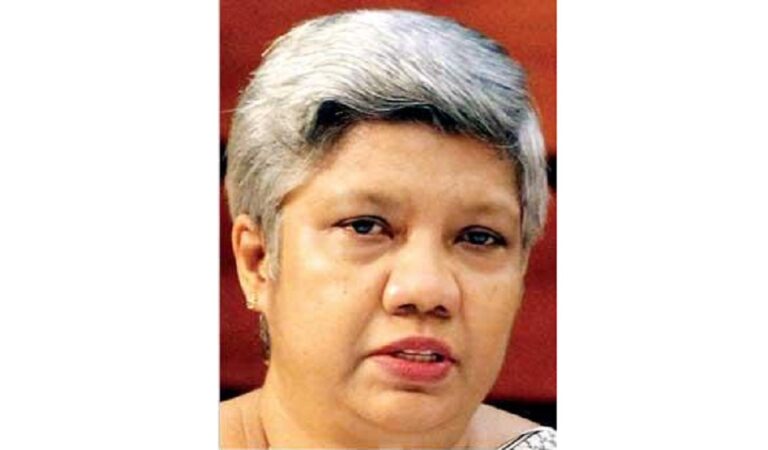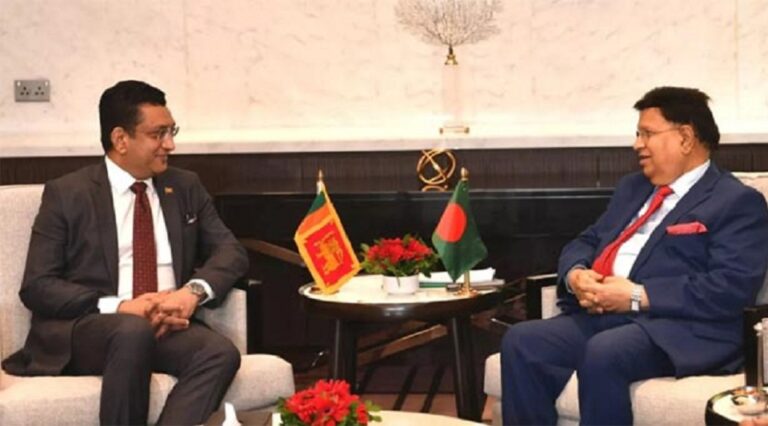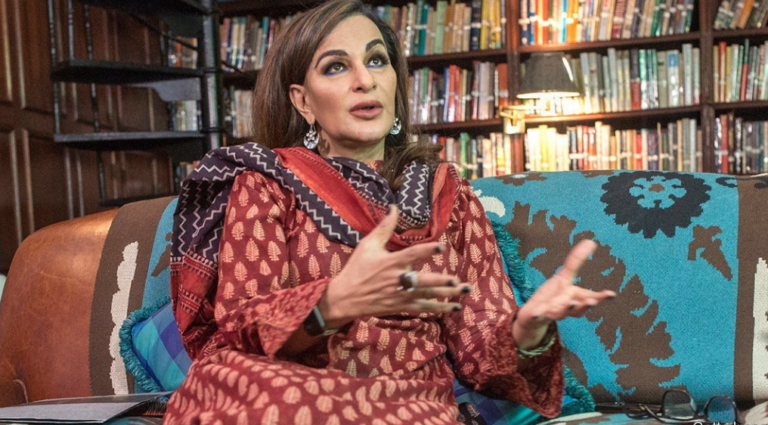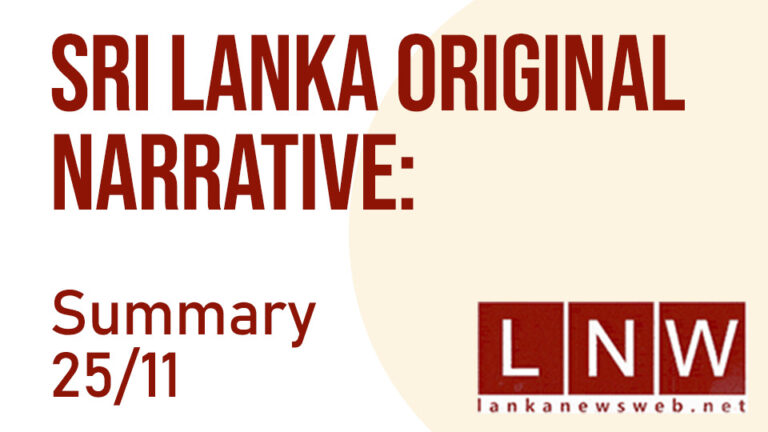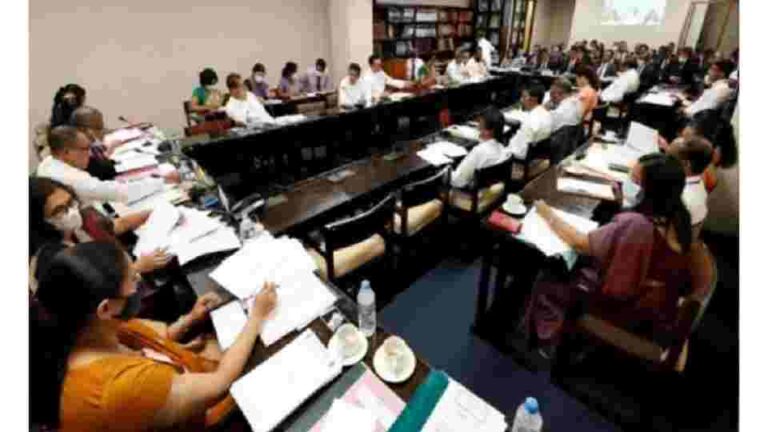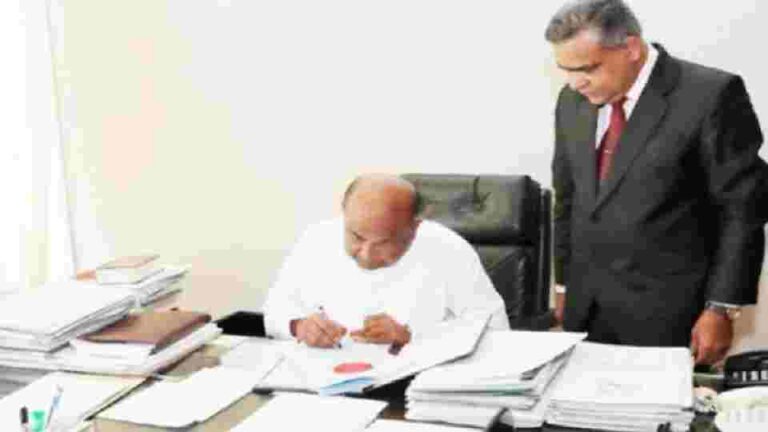- Tamil National Alliance says it would engage constructively with a process that may be initiated by President Ranil Wickremesinghe to settle the national ethnic issue through the “devolution of power”: also say they hope the process will be genuine.
- National Trade Union Centre Convenor Wasantha Samarasinghe says they have declared 5, 6, and 8 December as “days of protest” against Budget 23: issues of contention said to be Privatisation of Govt institutions, Revision of labour laws, Increase in taxes, and moves to Curtail salaries and other benefits of public and private sector employees.
- Chinese Embassy in Sri Lanka says Oil tanker carrying 10.6 mn liters (9,000MT) of diesel donated by China to the Sri Lankan farmers & fishermen will berth in Colombo today: Chinese Ambassador Qi Zhenhong assures President Wickremesinghe of China’s continued support to Sri Lanka to overcome current challenges.
- Man throws 1-1/2 year old child from the 3rd floor of a building in Grandpass: infant succumbs to the injuries: conflicting reports emerge that the man was of unsound mind and also that he was under the influence of a narcotic drug named “ice”.
- Committee on Parliamentary Businesses decides to take the 2nd Reading of the Value Added Tax (Amendment) Bill and the Inland Revenue (Amendment) Bill for debate in Parliament on 9th December.
- Head of National Influenza Centre of the Medical Research Institute and Consultant Virologist Dr Jude Jayamaha says a rising trend is being witnessed in H1N1 influenza cases among adolescents and adults: asks persons in “high-risk” categories to seek immediate medical attention.
- President Ranil Wickremesinghe asks the Human Rights Commission not to interfere in the duties of the Police: says protestors are trying to get the HRC to hinder the Police: asserts he has asked the Attorney General to look into the matter.
- Students of the Law College seek to reverse the decision of the Council of Legal Education to hold its internal examinations in English only: discuss the demand with leaders of the executive, legislative, and judicial branches of Government.
- Energy Minister Kanchana Wijesekara says the Electricity Board is incurring a loss of Rs.423 bn even after the recent tariff revision: also says increasing electricity tariffs further will be inevitable to continue power supply: laments the present generation cost is Rs.889 bn, but only Rs.400 bn is the revenue, even after the tariff increase in August.
- Sri Lanka loses to Afghanistan by 60 runs in the 1st Cricket ODI: Afghanistan 294/8 (50 overs): Sri Lanka 234 all out (38 overs).
Sri Lanka Original Narrative Summary: 26/11
HRW urges major creditors to help restructure Sri Lanka’s debts
International human rights organisation, Human Rights Watch (HRW) urged Sri Lanka’s major foreign creditors, including China, Japan, and India to help restructure debts and urgently mitigate the adverse human rights impacts of the country’s worst-ever economic crisis.
In a report by South Asia Director, Meenakshi Ganguly, the New York-based human rights watch dog stated that to stabilize the economy, international creditors should agree to restructure Sri Lanka’s debt so the country could secure final approval for an International Monetary Fund (IMF) loan and financing from other global agencies.
“Sri Lankan economists’ fear the economic situation could deteriorate rapidly without action by foreign creditors, placing the basic needs of millions of people in further jeopardy,” the report stressed.
The HRW reiterated that the IMF should use its procedures to make needed funds available as soon as possible, putting into place safeguards to protect people’s economic and social rights.
In April, Sri Lanka defaulted on over $50 billion in debts to international creditors, and in September, it reached a staff-level agreement with the IMF for a four-year, $2.9 billion bailout.
The first tranche of that bailout would ease the crippling shortage of foreign exchange and unlock access to other funding, including from the World Bank and the Asian Development Bank, which cannot provide new funding until the IMF agreement is completed.
Titled “Sri Lanka at Brink of Humanitarian Crisis – Financial Partners Should Support Basic Needs, Promote Respect for Rights”, the report noted that this month the United Nations renewed a humanitarian appeal, stating that 28 percent of the population faces food insecurity and that the poverty rate this year has doubled.
“Food price inflation was over 85 per cent in October, and acute shortages of foreign currency mean that many imports, including essential medicines, are scarce or unobtainable.”
The international pressure group also stressed that President Ranil Wickremesinghe’s administration should respect fundamental rights, including to peaceful protest.
“President Ranil Wickremesinghe has suppressed demonstrations and has used the notorious Prevention of Terrorism Act (PTA) to detain student activists. Wickremesinghe has even warned that he will again declare a state of emergency and deploy security forces in the event of major protests,” the HRW complained.
The report noted that without respect for human rights, including the right to peacefully protest, Sri Lankans cannot hold politicians accountable, whether for mismanagement or corruption.
It is essential that Sri Lanka’s international partners, including the US and European Union, press the government to fulfil its human rights obligations as an essential step towards addressing the crisis, it said.
Sri Lanka seeks to develop the migrant workers sector with the Philippines
Sri Lanka is exploring the possibility of collaborating with the Philippines to develop the migrant workers sector.
The Embassy of Sri Lanka in Manila organized a virtual meeting between the Ministry of Labor and Foreign Employment and the Department of Migrant Workers as a preliminary discussion on Sri Lanka’s interest to conduct a comprehensive study on the Philippines’ model of migrant worker recruitment and management.
The interactive discussion centered on potential areas for collaboration between the two countries particularly in sharing notable policies, best practices, and mechanisms for the inclusive and sustainable management of labor migration.
In her opening remarks, Ambassador of Sri Lanka to the Philippines Shobini Gunasekera highlighted the significant position of Sri Lanka and the Philippines as labor exporting countries and the valuable contribution of the migrant sector in economic recovery and development.
She expounded on the need of pursuing a stronger bilateral in strengthening the sector through the emulation of sound policies and actions that also cover the protection and advancement of the welfare and rights of migrant workers.
The utmost importance of addressing the plethora of socio-economic issues that entails labor migration such as the “brain-drain” phenomenon, job security, abuse, and social costs that adversely affect the families left behind in their home countries were also discussed.
Undersecretary for Policy and International Cooperation of the Department of Migrant Workers-Philippines (DMW) Atty. Patricia Yvonne Caunan chaired the session from the Philippines’ side. She welcomed the initiative of Sri Lanka to work with the Philippines in the capacity development in the migrant workers sector.
She briefed the attendees of the mandate, initiatives, and programs of the DMW and the potential areas where both countries may collaborate especially in policy reforms, formulation of mechanisms, and engagement with labor destination countries.
Consequently, Additional General Manager (International Affairs) of the Sri Lanka Bureau of Foreign Employment M.R.C.B Ekanayake, elaborated on Sri Lanka’s interest to learn from the Philippines’ experience in bilateral engagements with labor destination countries in the Middle East, skills and capability development of migrant workers, as well as on the established mechanisms and policies for protection of welfare and rights.
The two agencies signified their interest and committed to expand the said interaction into a series of virtual discussions in the coming weeks with the attendance of more relevant public sector stakeholders.
Sri Lanka’s nine banks to under go asset quality review
In the wake of Central Bank’s fresh directions to banking units allowing them to temporarily do away with the requirement to report the Statutory Liquid Assets Ratio (SLAR) ,nine banks have been identified as having asset quality stress.
The licensed commercial and specialized banks are required to maintain a minimum of 20 percent and a maximum of 40 percent of their adjusted liabilities in liquid assets, which typically are parked in Treasury bills and bonds.
However, in a Banking Act Direction issued recently, the Monetary Board has taken a decision to allow the licensed commercial banks “to maintain liquid assets of an amount not less than 20 percent of total adjusted liabilities, on a consolidated basis for the overall bank, until further notice”.
Hence, the circulars thus far in effect stipulating the requirement to maintain the SLAR separately for the Domestic Banking Unit and Off-Shore Banking Unit are temporarily deferred by the latest Direction issued.
Central Bank Deputy Governor Yvette Fernando yesterday said nine banks that have been identified as having asset quality stress will be reviewed soon.
“It is (asset quality review) yet to start. We are in the final stage of appointing reviewers,” she said in response to a query posed by journalists at the post-Monetary Policy Review Meeting yesterday.
In February, Fitch Ratings warned that Sri Lanka’s banks are likely to face continued asset-quality pressure in 2022, as rising macroeconomic stresses stemming from the sovereign credit profile pose a threat to borrowers’ repayment capacity, alongside the conclusion of most relief measures in 2021.
“We believe Sri Lankan banks face added asset-quality pressure from their Government securities holdings, particularly those denominated in foreign currency which accounted for around 6.5% of Fitch-rated banks’ total assets at end-9M21,” the rating agency noted.
The Deputy Governor also said the review of the banks will be conducted in a phased manner. “We will review six banks in the first phase and another three banks thereafter,” Fernando added.
In April, Fitch Ratings again placed the National Long-Term Ratings of 13 Sri Lankan banks on Rating Watch Negative (RWN).
The banks include; People’s Bank, Commercial Bank of Ceylon PLC, Hatton National Bank PLC, Sampath Bank PLC, National Development Bank PLC, DFCC Bank PLC, Seylan Bank PLC, Nations Trust Bank PLC, Pan Asia Banking Corporation PLC, Union Bank of Colombo PLC, Amana Bank PLC, SANASA Development Bank PLC and Housing Development Finance Corporation Bank of Sri Lanka.
Bangladesh seeks direct shipping connectivity and entering into PTA with Sri Lanka
Bangladesh has expressed willingness on direct shipping connectivity with Sri Lanka and the resumption of negotiations for early conclusion of preferential trade agreement (PTA) between the two countries.
Shipping collaboration is another major potential area that exists between two countries and discussions will be held to divert more shipping connectivity towards the port of Colombo. Diversification of trade in the field of IT, tourism
Further the port of Colombo and Chittagong can be developed as regional shipping hubs. This will enhance transshipment facilities and greater opportunities for investment. Trade and shipping can be complimented by each segment to encourage bilateral trade.
Exchange of shipping delegations between Sri Lanka and Bangladesh can usher in passenger and cruise shipping operations which will be a greater impetus to the tourist industry.
These details were disclosed following the meeting of Foreign Minister Dr A.K. Abdul Momen with his Sri Lankan counterpart Ali Sabry on Wednesday evening, on the eve of the 22nd Ministerial Meeting of Indian Ocean Rim Association (IORA).
The two foreign ministers discussed the wide spectrum of bilateral relations and expressed hope to work closely for their countries and inclusive development of the region.
Momen requested to boost trade relations between Bangladesh and Sri Lanka through increased export of agricultural products and pharmaceuticals from Bangladesh at an affordable price.
The foreign minister of Sri Lanka assured that his country is also looking forward to working together with Bangladesh.
The two leaders agreed to expedite forming an institutional platform to hold regular and comprehensive dialogues between the countries at the foreign minister level.
The issue of mutual support for each other’s candidature at various international fora was also discussed with due importance.
Foreign Minister Momen also sought the support of Sri Lanka in repatriating the forcibly displaced Myanmar nationals.
Foreign Minister of Sri Lanka Ali Sabry arrived in Dhaka on Wednesday afternoon to attend the 22nd ministerial meeting of IORA.Earlier, he also met the state minister for shipping.
Minister Sabry is expected to call on the Prime Minister of Bangladesh along with the ministerial delegations from other member states of IORA and leave Dhaka on November 26.
Sri Lanka and Bangladesh are celebrating the golden jubilee of bilateral ties this year recognizing each other’s contribution to their socio-economic development.
At present the bilateral trade between two countries amounts to $ 300.0 million and there is potential to expand further. The comparative advantages both countries enjoy and possess in trade can be harnessed for further development.
Bangladesh welcomes investments from Sri Lanka and appreciates the Sri Lanka’s professionals who are rendering a yeoman service to uplift the Bangladesh Garments, Banking and other manufacturing industries.
How Pakistan emerged as a climate champion
Pakistan is not often praised for its leadership. Yet its climate change minister, Sherry Rehman, was one of the star turns at the un climate talks held in Sharm el-Sheikh last week. At the helm of the “g77+China” negotiating group of developing countries, Ms Rehman won plaudits for shepherding a new deal to channel money from rich countries to poor ones that have suffered climate-related disasters. It was the annual climate jamboree’s single main achievement.
Ms Rehman, a former journalist, information minister and ambassador to America, blends well-heeled glamour and toughness. A rare champion of Pakistani liberalism, the 61-year-old Karachiite is known for her fights against honour killings and the country’s cruel blasphemy laws. They have earned her multiple death threats. She also bears scars from a suicide blast aimed at her friend Benazir Bhutto (the former prime minister survived that jihadist attack, but not one weeks later). By comparison, the talks in Sharm el-Sheikh must have seemed like the holiday camp that the Egyptian town usually is.

Yet Ms Rehman was also assisted by the fact that the massive floods Pakistan suffered this year, costing an estimated $30bn in damages, are one of the biggest climate-related disasters on record. They gave moral authority to her argument that poor countries should receive “loss and damage” funds from the rich countries whose emissions have contributed to such calamities. A study attributes the engorged monsoon floods in part to global warming. Yet Pakistan is responsible for less than 1% of the stock of global emissions.
Pakistani environmental activists, a subset of the country’s embattled liberal campaigners, hope Ms Rehman’s triumph will stir more climate action back home. It had been modestly increasing before the floods—with, for example, a few cases in which activists sued the government for neglecting its environmental commitments. Yet Pakistan’s climate change ministry is vastly underfunded. Just $43m were allocated to it this year from a federal budget of $47bn. A proposed national climate change authority has yet to be formed, five years after a law was passed to facilitate it. Pakistan, which experiences some of the hottest temperatures on Earth, has only just begun serious work on a national adaptation plan.
The floods helped publicise such shortcomings. Pakistan’s few climate experts were suddenly hot property on the country’s news channels. But will that focus be maintained? As the government scrambles to provide flood relief, it is giving little thought to climate-proofing against future disasters. Before the floods, Ms Rehman was pushing a $11bn-17bn initiative to regenerate the Indus river that supports the livelihoods, indirectly or directly, of over 200m people. But funds that might have been earmarked for the programme are now going on flood relief.
The heightened global attention she has brought to Pakistan’s flood losses could attract a lot more money and relevant expertise. That could make the country a poster child not only for loss-and-damage activism but, more usefully, for long-term planning and climate resilience. There is a precedent for this. After a devastating cyclone in 1970 Bangladesh built one of the world’s best disaster preparedness schemes. A tragic, likelier scenario would see the momentum generated by Pakistan’s calamity and Ms Rehman’s astute diplomacy lost in a protracted relief effort and Pakistan’s usual obsessions with politics and scandal. At least, until the floodwaters rise again.■
THE ECONOMIST
Stop unnecessary “Psychiatric Evaluations” based on Sexual Orientation
An opinion piece by Mathuri Thamilmaran, National Legal Advisor – Sri Lanka at the International Commission of Jurists
Two recent cases reported in the Sri Lankan media involving “psychiatric evaluations” based on sexual orientation garnered interest among lesbian, gay, bisexuals, transgender, intersex and queer (LGBTIQ) individuals and their allies. The facts of these cases highlight how some members of the Police and the judiciary still consider same-sex relationships an aberration requiring “psychiatric evaluation”. It is unfortunate that some law enforcement officials and members of the judiciary have recourse to such discriminatory practices in violation of internationally recognized standards.
The first case concerned an Indian woman who had arrived in Sri Lanka in June this year to meet her girlfriend who lived in Akkaraipattu, Ampara District. Her girlfriend’s father complained to the police, which subsequently arrested the couple for being in a same-sex relationship and produced them before the Akkaraipattu Magistrate court. The court ordered that the two women be sent for a “psychiatric evaluation”. According to media reports, after the “evaluation”, at a subsequent hearing before the same court, both women were released and the Indian woman was ordered to be sent back to India, while the Sri Lankan woman was sent to a safe house to ensure her safety from her family and others in her area of residence. Subsequently, media reports clarified that the court’s “psychiatric evaluation” order was only due to both women having threatened to commit suicide if separated. In practice though, the ordering of psychiatric evaluations is done routinely by Magistrates in cases involving individuals accused of engaging in same – sex sexual relationships.
In another reported case, a lesbian woman was forcibly confined at home by her family and taken to meet priests at religious shrines and forced to repeatedly denounce ‘homosexuality’ as a sin. She was also threatened by family members that she would be forced to attend counselling sessions, or that she would be sent to rehabilitation because “she was mentally ill”. When one of her friends complained to the police about the forced confinement, the woman and her friend were both threatened by the police. Upon the request of the lesbian woman’s family the police forced her to submit to a “psychiatric evaluation” to prove that “she was mentally ill”, and to handover her laptop to the police to find evidence of her same-sex relationship. Her family filed a case requesting that court order a “psychiatric evaluation” by a Judicial-Medical Officer (JMO) to prove that she was mentally ill, and an ‘interim’ Magistrate did make such order. Her lawyers challenged the order in the High Court and the Magistrate being informed of this found that there was no evidence to show that the woman was mentally ill and dismissed the case.
Sections 365 and 365A of Sri Lanka’s Penal Code of 1883 criminalize “carnal intercourse against the order of nature” and “acts of gross indecency”, respectively. Both sections have been used to criminalize consensual same-sex sexual relations, although the Penal Code does not provide a definition of the terms used by those sections. Those convicted of the ‘crime’ may face up to ten years’ imprisonment.
The Sri Lankan Constitution in Article 12 guarantees the right to equality before the law and equal protection of the law of all persons. It prohibits discrimination on grounds of race, religion, language, caste, sex, political opinion, and place of birth but does not prohibit discrimination on the grounds of sexual orientation, gender identity or gender expression (SOGIE). The Sri Lankan government has in the past indicated before various UN bodies that Article 12 included non-discrimination based on SOGIE, but as seen above, explicit provisions and application of the law seem to negate this argument.
The CEDAW (Convention on the Elimination of All Forms of Discrimination against Women) Committee in its March 2022 decision in the case brought by Rosanna Flamer-Caldera of EQUAL GROUND against Sri Lanka stated that criminalisation of same–sex relationships between women was a human rights violation. The Committee said that the Penal Code provisions criminalising same-sex relationships violate the right to non-discrimination provided in the Convention, and recommended decriminalisation of consensual same-sex sexual relationships.
At a recent workshop for Sri Lankan lawyers held by the International Commission of Jurists (ICJ), participants cited many examples similar to the two cases recounted above where judges automatically order “psychiatric” or “physical” “evaluations” as a first step in cases against those accused of being in a same-sex relationship. This is an erroneous act in contravention of human rights protections available to all persons, including lesbian, gay and bisexual individuals. Such orders cause much mental harm to those subjected to such evaluations.
In August 2021, however, the Sri Lanka College of Psychiatrists issued a statement denouncing the view that homosexuality was a mental illness as a myth not in keeping with evidence-based science and calling on the authorities to abolish section 365 of the Penal Code. This echoes the statement by the Indian Psychiatric Society in 2018, which stated that same-sex sexuality was “a normal variant of human sexuality much like heterosexuality and bisexuality” and that there is no scientific evidence to prove that sexual orientation can be altered by treatment, but, instead, that such treatment would lead to low self–esteem and stigmatization of the concerned individual. The statement drew from the position of the American Psychiatric Association and The International Classification of Diseases of the World Health Organization both of which removed homosexuality from the list of psychiatric disorders in 1973 and 1992, respectively.
The statement by the Indian Psychiatric Society called for decriminalization of homosexuality and was cited approvingly by the Indian Supreme Court in the 2018 case that effectively decriminalized consensual same-sex relationships in India (Navtej Singh Johar & Ors. v. Union of India). In that case, the Supreme Court of India also noted that lesbians and gay men would enjoy better mental health feeling positive about their sexual orientation through “coming out”, and that being able to disclose their sexual orientation to others increased the availability of social support, which was crucial to mental health.
Non-consensual corrective treatment, including “mental/psychiatric evaluations” for LGBTIQ individuals, violates their human rights, such as their right to health guaranteed by Article 12 of the International Covenant on Economic Social and Cultural Rights (ICESCR), and also constitutes a form of torture or other cruel, inhuman or degrading treatment or punishment in violation of Article 7 of the International Covenant on Civil and Political Rights (ICCPR) and Article 11 of the Sri Lankan Constitution. Further, the Human Rights Committee has interpreted Article 9 of the ICCPR, which states that “[e]veryone has the right to liberty and security of person”, to include “freedom from injury to the body and the mind, or bodily and mental integrity”. Sri Lanka is a State Party to both Covenants.
The Yogyakarta Principles (2007) which are a set of principles that apply international human rights law to sexual orientation and gender identity categorically state in Principle 18 that sexual orientation and gender identity are not medical conditions and therefore cannot be treated, cured, or suppressed. Principle 32 (introduced by YP+10 in 2017) likewise affirms the right to bodily and mental integrity, autonomy, and self -determination irrespective of an individual’s sexual orientation or gender identity.
“Psychiatric evaluations” because of one’s sexual orientation whether at the behest of family members, healthcare professionals or authorities, including the judiciary are unnecessary. In court, such evaluations are ordered entirely at the judge’s discretion, as there is no law or policy requiring them. Such unnecessary “psychiatric evaluations” must be stopped as they are in violation of human rights and inconsistent with international law.
SRI LANKA ORIGINAL NARRATIVE SUMMARY: 25/11
- Japanese Investment Bank Nomura warns 7 countries including Sri Lanka are now at a high risk of currency crises: as per Nomura’s estimates Sri Lanka’s score is 138, while a score above 100 indicates a 64% chance of a currency crisis in the next 12 months.
- President Ranil Wickremesinghe says privatising profit-making State Owned Enterprises commenced under former President Ranasinghe Premadasa: also says he is following in those footsteps.
- Ministerial Advisory Committee on Sports and Youth Affairs that met under the chairmanship of Minister Roshan Ranasinghe learns that an amount of USD 800 has been paid per day to each person who participated in the recent T20 World Cup held in Australia.
- Central Bank says Sri Lanka receives around USD 1.45 bn from goods exports and USD 251 mn from services: also says authorities are now “policing” forex earnings: expresses concern that the full amount of Forex is not being converted.
- CB Governor Weerasinghe says Sri Lanka is in negotiations with the IMF: admits the December target for finalising the programme cannot be met: says Sri Lanka will definitely be ready to take its request to the IMF Board by January 2023.
- Central Bank maintains SDFR and SLFR at current levels: gross official reserves estimated at USD 1.7 bn at end October 22: while CB Governor Weerasinghe says “money printing” has reduced drastically, data shows Treasury Bill issues by Government during his term has increased by over Rs.800 bn.
- Public Security Minister Tiran Alles says UN Resident Representative Hanna Singer-Hamdy was pleased with the way law enforcement authorities had controlled the recent Opposition protests.
- Government issues gazette relaxing the import ban on several items including Refrigerators, Air-conditioners, Washing Machines and Brake Pads, with effect from 23rd November 2022.
- CB Governor Dr Nandalal Weerasinghe admits he receives a salary of Rs.400,000 plus a Pension from the Central Bank: CB sources say Weerasinghe receives a pension of Rs.921,000 on the 10th and salary of Rs.400,000 + allowances of 73,000 on the 25th of every month: sources point out this is the first time in history that an official from the Central Bank receives a salary and pension at the same time.
- Sri Lankan batsman Bhanuka Rajapaksa withdraws from Afghanistan’s tour of Sri Lanka: team announced.
CoPA Sub-Committee to resolve issue of lacking skilled workers to meet foreign job demands!
The Committee on Public Accounts (CoPA) disclosed at the Committee meeting held three days ago (22) that complaints against the currently suspended Omani embassy officer were made since February this year, but a decision on the matter has been delayed.
Additional Auditor General. P. L. K Perera pointed out that on 28.02.2022, the former chairman of the Foreign Employment Bureau has requested an investigation through the Internal Audit Division regarding this particular officer. The Additional Auditor General further pointed out that financial fraud, certificate fraud, etc. had been reported regarding this official.
Thus, it was disclosed that the former chairman of the Foreign Employment Bureau, Maj. Gen. Mahinda Hathurusinghe, had requested the Ministry in February to make arrangements for him to be recalled to the island immediately, as probes could be hindered should the person remain in the post.
The committee expressed its strong displeasure for not taking action until the incident received a lot of publicity through the media.
The Director General of the Foreign Employment Bureau said that on 28.02.2022, according to the request of the former chairman of the Foreign Employment Bureau, an investigation on this official was conducted through the Internal Audit Division, but the allegations could not be confirmed.
The Director General added that after calling for a report from the Ambassador of Oman and based on the investigation report received from the Criminal Investigation Department (CID) on November 4, 2022, the Bureau too acted on suspending the said officer.
The Committee expressed its displeasure over the lack of prompt action regarding this officer and questioned on the matter at length. The secretary to the Ministry of Labour and Foreign Employment said that even though he came to this Ministry after the month of May this year, he will accept the responsibility. The committee pointed out that even if the secretary changes, the officials should take responsibility for this.
The absence of trained workers to meet the demand for foreign jobs in many fields including nurses was also taken into discussion at length. CoPA also pointed out that the responsibility of the Foreign Employment Bureau is not to send unskilled workers abroad, but to work with all other relevant ministries and institutions in a joint approach to send skilled workers abroad to meet the demand for foreign jobs.
Thus, the committee chairman instructed the secretary to the Ministry of Labour and Foreign Employment to prepare a mechanism within two months to send trained workers to meet the demand of foreign jobs in good coordination with the Ministry of Foreign Affairs, Ministry of Public Administration, Ministry of Education and other related institutions.
Furthermore, a CoPA sub-committee will be appointed in this regard, disclosed CoPA Chief MP Kabir Hashim.
CoPA subcommittee chair MP (Dr.) Sudarshini Fernandopulle, MPs J.C. Alawathuwala, Ashok Abeysinghe, (Dr.) Major Pradeep Undugoda, Wasantha Yapabandara, Weerasumana Weerasinghe, (Dr.) Harini Amarasuriya, Ananda Wimalaweera Secretary to the Ministry of Labour and Foreign Employment, Aruni Wijewardena, Secretary to the Ministry of Foreign Affairs, Priyantha Mayadunna, Secretary to the Ministry of Public Administration, Nihal Ranasinghe, Secretary to the Ministry of Education and other officials were present at the occasion.
MIAP
Poisons, Opium, & Dangerous Drugs (Amendment) Act in effect from Nov 23rd!
The Poisons, Opium, and Dangerous Drugs (Amendment) Bill passed in Parliament on October 19th, 2022 shall come into effect as the Poisons, Opium and Dangerous Drugs (Amendment) Act No. 41 of 2022 from November 23rd, following Speaker Mahinda Yapa Abeywardena endorsing the certificate on the Bill.
The Minister of Justice, Prisons Affairs and Constitutional Reforms submitted the bill to Parliament to amend the Poisonous Opium and Dangerous Drugs Ordinance.
The Poisonous Opium and Dangerous Drugs Ordinance amends the law relating to Poisonous Opium and Dangerous Drugs. The amendment of this Act is expected to update and strengthen the existing law based on the needs arising from the time regarding the possession and use of the importation of drugs.
MIAP

